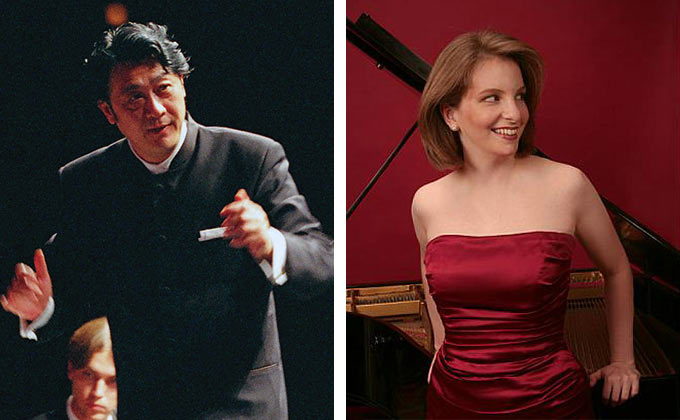Beijing to Buffalo
by Jan Jezioro

Beijing Symphony Music Director Tan Lihua makes his BPO debut
Anyone who chooses to attend either one of the BPO’s pair of concerts this weekend—on either Saturday, April 14 at 8pm, or Sunday, April 15 at 2:30pm—will have the unique opportunity to hear the foremost conductor in the People’s Republic of China lead our orchestra. Tan Lihua, music director and principal conductor of the Beijing Symphony Orchestra, the premier orchestra in China’s capital city, will make his Buffalo debut in program featuring a pair of Western classical music favorites by Borodin and Saint-Saëns, as well as a work by Fang Kejie, one of China’s leading contemporary nationalist composers.
The Beijing Symphony Orchestra was founded in 1977, soon after the massively chaotic upheavals of the Chinese Cultural Revolution (1966-1976), during which countless Chinese ancient buildings, artifacts, antiques, books, and paintings were destroyed by the Red Guards, and anything that smacked of Western culture, including classical music, was banned. Since its founding, the BSO has gained high acclaim and wide praise from audiences around the world for its high artistic standard, wide repertoire, and uniquely Chinese sound.
A highly sought after and widely respected conductor on the Chinese music scene, Tan Lihua is in great demand both at home and abroad. He has been invited to conduct the Russian State Academic Symphony Orchestra, the London Philharmonic Orchestra, the Israel Philharmonic Orchestra, and the Royal Philharmonic Orchestra. As a guest conductor, Tan Lihua has led orchestras in Russia, the US, Germany, France, Italy, Canada, Switzerland, Israel, Spain, Australia, Argentina, Mexico, Colombia, and Panama. He has also conducted all of China’s best known domestic orchestras, and he has led the Beijing Symphony Orchestra on three successful European tours, during the course of which one German reviewer observed: “Tan Lihua, the principal conductor, has a style filled with deep reverence. His conducting is a blend of Eastern and Italian styles, technically outstanding, and profoundly emotional.”
Surprisingly, given the still very unsettled political and social situation in Tibet, the sole Chinese musical work on Lihua’s program this weekend is the 1999 composition Tibet Dance, by Fang Kejie, inspired by the Tibetan folk artists who perform a strongly rhythmical ancient dance known as the ReBa. According to the BPO program note annotator Edward Yadzinski, Kejie has received national awards in China “in recognition of his ability to express profound ideas in a distinctly plain musical language, without ambiguity.”
The engaging young American pianist Orli Shaham is a Buffalo audience favorite, due both to her local appearances in recital with her brother, violinist Gil Shaham, as well as to her own solo appearances with the BPO, most recently in 2005 as soloist in Dohnanyi’s irresistible Variations on a Nursery Song. She returns as the soloist in a concerto by French composer Camille Saint-Saëns.
Among the many concertos that Saint-Saëns wrote for cello, violin and his own instrument the piano, the single most popular is his Piano Concerto No. 2 in G Minor, Op. 22, composed in less than three weeks at the end of 1868 for a performance by himself. Saint-Saëns wrote the work at the request of the renowned Russian pianist, composer, and conductor Anton Rubinstein, since after having performed a cycle of concertos on eight evenings in Paris under the baton of Saint-Saëns, Rubinstein wished to conduct a performance that featured his talented younger friend as soloist. In the event, the speed with which Saint-Saëns had to write the concerto left insufficient time for the prodigiously talented composer to completely master the performance of the work to his own very high standards. Nevertheless, the witty and effervescent work, of which the Polish pianist and composer Zygmunt Stojowski once famously quipped, “it begins with Bach and ends with Offenbach,” quickly gained a permanent place at the heart of the piano concerto repertoire that it retains to this day.
Aleksandr Borodin, along with Mili Balakirev, Modest Mussorgsky, César Cui, and Nikolai Rimsky-Korsakov, was a member of the 19th-century Russian nationalist group of composers known as the Mighty Handful, who wanted to reinterpret Western classical music in a distinctively Russian manner through the use of native folk music elements. While his dramatically colorful Symphony No. 2 in B Minor is the most often performed symphony by any member of the Mighty Handful, the BPO has performed the work only three times previously, most recently in 1977 and 1978, in a pair of unusually programmed back-to-back performances under the baton of then music director Michael Tilson Thomas. The highly programmatic, lushly orchestrated score, with its wealth of passionate Russian musical themes, gives the symphony something of the air of a tone poem.
For tickets and more information, call 885-5000 or visit www.bpo.org.
blog comments powered by Disqus|
Issue Navigation> Issue Index > v11n15 (Week of Thursday, April 12) > Beijing to Buffalo This Week's Issue • Artvoice Daily • Artvoice TV • Events Calendar • Classifieds |









 Current Issue
Current Issue